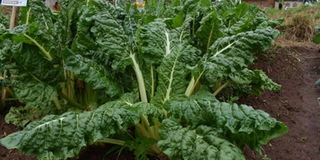Simple ways to improve fertility

Farmers are encouraged to apply organic manure to improve soil fertility. PHOTO/FILE
What you need to know:
- Farmers should always rotate with cover and green manure crops in order to increase soil organic matter.
Fertilisers are plant nutrients applied to agricultural fields to supplement required elements found naturally in the soil.
When farmers engage experts to test their soils, they will know which nutrients are lacking and will be advised what fertiliser to apply in the soil in the required quantity.
Farmers can easily improve their soil fertility and further prevent pests and diseases through rotations, cover cropping and the application of animal and plant materials as opposed to using chemical substances.
Research
Recent research shows that plant resistance to insects and diseases is linked to optimal, chemical, physical and biological properties of soil.
According to a 2017 review on Current Status of Soil Contamination in Kenya published by International Journal of Environmental Monitoring and Analysis, the main sources of soil contaminations are anthropogenic activities which are among other things synthetic chemical products.
Some of the main elements that can help reduce pest issues in soil include cleanliness, mulching, and proper cultivation, introduction of different organisms in the soil such as red worms, soil food web and increasing soluble nitrogen levels among others.
Research has shown that increasing soluble nitrogen levels in plants can decrease their resistance to pests, resulting in higher pest density and crop damage.
Healthy soils
In addition to supporting vigorous growth of plants better able to tolerate pest damage, healthy soils also contain many natural enemies of insect pests, including insect predators, pathogenic fungi, and insect-parasitic nematodes.
Organic matter
Another focus should be on increasing soil organic matter to improve soil structure and to provide food for soil microbes that in turn make nutrients available to plants.
Farmers should always rotate with cover and green manure crops in order to increase soil organic matter.
Manure and compost can also be added to supply organic matter and to provide supplemental nutrients.
Cultivation and tillage can be beneficial because it disrupts the life cycle of insect pests and can expose pests to predators and the elements.
Beware
However, excessive tillage can accelerate the decomposition of soil organic matter and deplete the food source that soil microorganisms depend on, decreasing their ability to disrupt pests. Excessive and untimely tillage can also contribute to soil erosion.
According to agronomists, organic or synthetic mulches, can help reduce insect pest problems.
Plastic mulch is often used to speed early season crop growth that makes plants better able to tolerate insect feeding. Reflective mulch repels thrips and aphids and can reduce the incidence of insect-transmitted virus diseases in vegetable crops.
Study has shown that straw mulch can suppress early season pests activity by creating a micro-environment that increases the number of predators such as ground beetles, lady beetles, and lacewings. Mulching with straw can also reduce the pests’ ability to locate plants.
Crop rotation
Different crops need different soil nutrients to thrive and interchanging them, Carol Mutua, a soil agronomist, says, crop rotation gives the backyard garden space to regenerate a particular nutrient.
“This should be done in a manner informed by expert knowledge of the nutrients needs of every plant,” she explains.
“Shallow rooted crops such as cabbage and carrots should be alternated with deep-rooted ones in a garden like maize, sugarcane and bananas,” says Mutua.
She says while crops from the same family such as Irish potatoes and tomatoes should not follow each other in a backyard garden rotational scheme, it’s important to always include legumes like groundnuts or peas to improve soil fertility.




